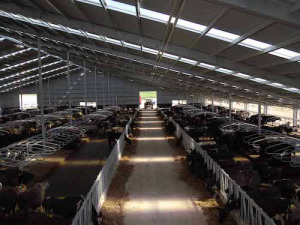Editorial: Happy days
OPINION: The year has started positively for New Zealand dairy farmers and things are likely to get better.
 MPI says it is continuing to build the picture of where the cattle disease Mycoplasma bovis is present and contain it to those farms.
MPI says it is continuing to build the picture of where the cattle disease Mycoplasma bovis is present and contain it to those farms.
MPI says it is continuing to build the picture of where the cattle disease Mycoplasma bovis is present and contain it to those farms.
A second South Canterbury dairy farm belonging to the Van Leeuwen Dairy Group has tested positive for Mycoplasma bovis.
MPI says the detection isn't unexpected, because of the close proximity to the first infected farm.
All of the group's farms remain in lock down, to stop the disease spreading to neighbouring animals.
MOI Director of Response Geoff Gwyn says the main way the disease can spread is through direct contact between cattle, such as nose to nose.
“All the other potential factors such as on equipment, clothing and footwear, effluent and vehicles present a comparatively low risk.
“We encourage farmers to pay attention to what are routine biosecurity measures such as on-farm hygiene, caution around stock movements and fencing stock back from neighbouring fence lines.
“It is natural for people to be worried, especially those directly affected and living close by - but we don’t want people to be unnecessarily concerned.”
Gwyn says MPI is holding a further community meeting tomorrow to provide an update on the progress in the response. The meeting is at 11am at the Papakaio community hall, just north of Oamaru.
MPI is currently testing samples from the 16 Van Leeuwen farms as well as from neighbouring properties and a small number of additional farms that tracing has indicated may have received stock from the Van Leeuwen group.
These farms will receive visits and stock checks but they are not currently subject to Restricted Place Notices.
“They are being checked on a precautionary basis and at this time there is not a sufficient level of risk to require the imposition of controls,” Gwyn says.
To date 25 animals on the first affected farm have been euthanised by the farmer for welfare reasons. A further group of affected animals has been checked by a vet and is fit for transport to slaughter.
“People in the area will start to see stock movements and I understand this is something that is worrying local farmers. I’d like to reassure them that any risk from transporting cattle from the Van Leeuwen farms to processing plants has been assessed as negligible and is being managed. This movement of the stock is being permitted by MPI and vehicles will be cleaned and disinfected after use under MPI supervision.”
MPI reinforces the message that Mycoplasma bovis is poses no risk to human health or the safety of food products – meat or dairy.
“There is no reason to hold meat and milk from the affected farms back from processing.”
Gwyn says MPI is managing the situation with urgency because of the disease’s impacts on farm management, animal welfare and production. Ideally we’d like to contain it and get rid of it and that is our current focus.
One of New Zealand’s longest-running pasture growth monitoring projects will continue, even as its long-time champion steps away after more than five decades of involvement.
The Insurance & Financial Services Ombudsmen Scheme (IFSO Scheme) is advising consumers to prepare for delays as insurers respond to a high volume of claims following this week's severe weather.
Additional reductions to costs for forest owners in the Emissions Trading Scheme Registry (ETS) have been announced by the Government.
Animal welfare is of paramount importance to New Zealand's dairy industry, with consumers increasingly interested in how food is produced, not just the quality of the final product.
Agriculture and Forestry Minister Todd McClay is encouraging farmers and growers to stay up to date with weather warnings and seek support should they need it.
The closure of SH2 Waioweka Gorge could result in significant delays and additional costs for freight customers around the Upper North Island, says Transporting New Zealand.
OPINION: There will be no cows at Europe's largest agricultural show in Paris this year for the first time ever…
OPINION: Canterbury grows most of the country's wheat, barley and oat crops. But persistently low wheat prices, coupled with a…